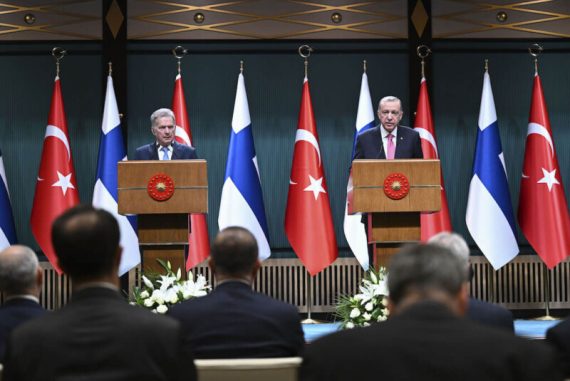H
aving fought both the Soviets and the Nazis in World War II and suffered territorial losses, Finland declared neutrality at the end of the war and has not joined any military alliances since then. However, with the Russian invasion of Ukraine, the fear of Russia in Finland’s collective memory resurfaced. As a matter of fact, in Finland, which shares a 1,340 km land border with Russia, only 20 percent of the Finish people viewed NATO membership positively before the Ukraine war, but this percentage increased almost fourfold afterwards.
In other words, there was a strong expectation among Finns for an expedited NATO accession process that would guarantee the country’s national security. To meet these expectations, the Finnish government applied for NATO membership in May last year together with Sweden. On the other hand, Turkey requested that the two countries end their support for the FETO and PKK terror groups before approving their memberships.
The NATO membership process
Before moving to any detailed assessment of the topic, it should be noted that in accordance with the Washington Treaty (also known as the North Atlantic Treaty) that formed the legal basis of NATO, a country must complete a process consisting of seven stages in order to join the alliance. In the first phase, the parties negotiate a road map for the membership application. In the second phase, the candidate country declares with a letter of intent that it accepts the obligations for NATO membership. In this process, the parties also determine the reform calendar, if necessary. In the third phase, accession protocols are prepared for membership.
In the fourth and most important phase, as a natural consequence of the collective defense principle, every NATO member country must ratify the accession protocols. In other words, for a country to join NATO, it must receive the support of all member countries. In the fifth and sixth phases, the member states that allow the membership of the candidate country declare that they accept the accession protocols and invite the candidate country to the alliance. In the last stage, the candidate country completes the legal process and joins NATO.
Turkey’s approach
After Turkey became a NATO member in 1952, it has always approached the enlargement of the alliance positively and facilitated the membership processes of countries that want to join the alliance. Even today, Turkey, in principle, supports the memberships of Finland and Sweden, which want to join the collective defense umbrella of NATO. However, in accordance with the Madrid Memorandum signed in June last year, Turkey requires these two countries to cooperate with it in the fight against terrorism and to actively support its fight against FETO and the PKK.
Thus, Ankara is right in this regard, because Finland and Sweden have an important role in the European branches of both terrorist organizations. Unlike countries that hinder Turkey’s European Union membership process due to ideological prejudices and political calculations, Ankara does not seek to turn the situation that Finland and Sweden are facing into an opportunity. On the contrary, based on the principle of reciprocity, it desires to protect its own national security in the same way its counterparts protect theirs. In addition, Turkey is trying to strengthen its strategic autonomy on the axis of its own national interests by challenging all kinds of pressures.
Why Finland and not Sweden?
As tension over NATO membership between Turkey and the two Nordic continues, an important development took place last week. Turkish President Recep Tayyip Erdoğan declared that Turkey had lifted the veto for Finland’s NATO membership in the meeting with his Finnish counterpart Sauli Niinistö in Ankara. Erdoğan cited Finland’s more sincere attitude towards the fight against terrorism as a reason for Ankara’s policy change.
Taking a closer look at the issue, Stockholm has shown that it is not truly sincere in its fight against terrorism by allowing anti-Islam demonstrations of right-wing extremists and anti-Turkey rallies of PKK militants in recent months. Finland, conversely, showed greater sensitivity by avoiding such incidents on its territories. In other words, Helsinki did not provoke Ankara in this process, and, in return, received Turkey’s support for its NATO membership. In addition, Turkey’s policy of minimizing foreign problems played a positive role in its change of attitude towards Finland’s NATO bid.
Sweden, which applied to NATO together with Finland, made some concrete arrangements on the way to membership in accordance with the Madrid Agreement. For instance, it passed an anti-terror law in November, and the new government has been trying to pass a new counterterrorism bill against the financing, aiding, and propagation of terrorist groups.
Recommended
Turkey’s expectations
However, none of these meet Ankara’s expectations and to date, Sweden has not taken any serious step to address Turkey’s security concerns. So much so that Sweden still turns a blind eye to the actions of PKK militants on its streets and refuses to comply with extradition requests by Turkey. Moreover, it has allowed anti-Muslim attacks such as the burning of the Qur’an in front of the Turkish embassy in Stockholm.
Ankara is not against NATO enlargement per se. On the contrary, Turkey supports NATO’s open door policy, and this holds true for Finland and Sweden as well. However, since Turkey is determined to protect its national security and interests, it requires from these two countries to take a clear stance against the PKK and FETO, both of which threaten Ankara’s national security.
Turkey removed its veto on Finland’s NATO membership on March 17, 2023, showing that it will reciprocate if its counterparts keep their promises. If Sweden, like Finland, abides by Turkey’s red lines and takes the necessary steps, it also can achieve a tangible gain on the way to NATO membership before the Vilnius summit in July 2023.






